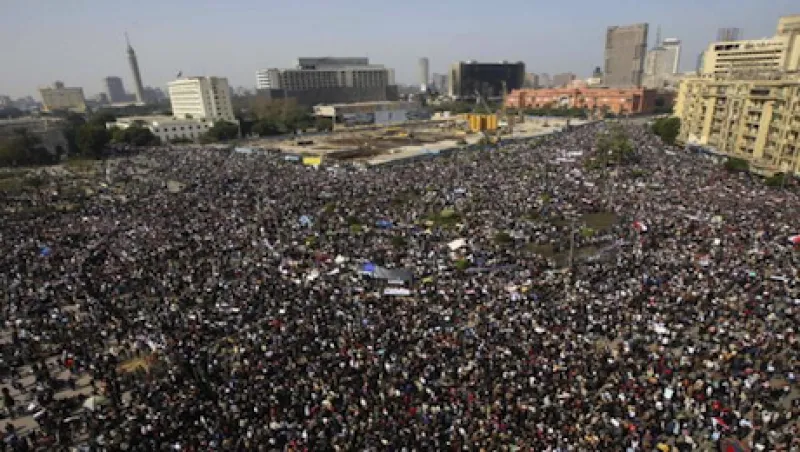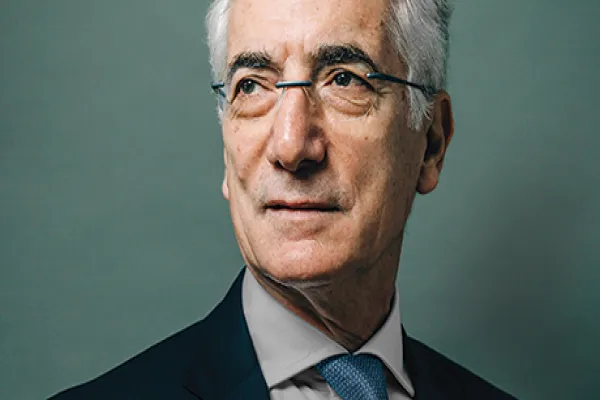With his country in crisis, Mahmoud Abdel Latif — Egyptian banker, turnaround artist and patron saint to an economy of small, credit-starved business owners — is nurturing a revolution of his own.
Early this month, he launched a counteroffer for troubled EFG-Hermes, the Cairo-based investment bank that announced in the spring it was selling its rump assets to a small Qatari investor called Qinvest. Under the terms of the deal, EFG-Hermes would merge its investment banking, fund management and brokerage operations with Qinvest for $250 million, a sum Abdel Latif says grossly undervalues the only full-service, regional investment bank in the Middle East. But against a backdrop of fresh political turmoil, the counteroffer may go by the boards.
“The Qataris cherry picked the best assets in the company, and they did it cheaply,” he said. “The EFG-Hermes managing directors secured an exit. It’s like the father sacrificing the mother and the child to save himself.”
The proposed merger, which has been approved by shareholders but is still under review by regulators, is widely regarded as a byproduct of the revolution a year ago that toppled Egyptian dictator Hosni Mubarak and undercut those associated with him and his family. In addition to collapsed deal flow, EFG-Hermes’ co-chairmen stand accused by prosecutors of making illegal profits along with Hosni Mubarak’s jailed youngest son. Rumors abound that one of the firm’s two chairmen is prohibited from leaving the country, and there are doubts that its most valued executives will pack up and leave Cairo for Qinvest’s headquarters in upstart, dull Doha. “No one appears to be leading the company and morale is low,” says an investment banker in Cairo who requested anonymity. “The way things are going they’ll lose some of their best people, and given the market it will be hard to replace them.”
EFG-Hermes declined repeated interview requests for this story. In June, company executives told The New York Times that the capital available to Qinvest — its chairman is Sheik Hamad bin Jassim al Thani, a member of the royal family and a son of the emirate’s prime minister — would greatly expand the firm’s capacity for new deals.
On the contrary, argues Abdel Latif, who most recently primed one of Egypt’s largest state-owned banks for divestment — to date the country’s only successful bank privatization. Qinvest, he said, would scoop up EFG-Hermes’ prime divisions at a time when the wave of corporate activity in the Middle East has crested, leaving behind little more than a back office in Cairo.
In the chaotic aftermath of Egypt’s presidential elections –– which saw the candidate of the Muslim Brotherhood, Mohamed Morsy, elected on Sunday with 51.7 percent of the vote –– suspicion is rising that the military is imposing a kind of slow-motion coup. As a result, Abdel Latif and his supporters may withdraw their offer for EFG-Hermes. Abdel Latif says the deal is "on hold" given the fluidity of events. According to Abdel Latif, they would have kept the firm whole and paid shareholders a cash premium to the market price of about 25 percent. They also commissioned a post-acquisition plan for a market that is struggling to survive what could be a generation of political change. Regardless of what happens to EFG-Hermes, he says, the big deals are done and it is time, once and for all, for Egyptian banks to confront the country’s vast, undercapitalized and untapped universe of small and mid-sized companies.
“I get calls every day from old clients begging me for help because the big players are not interested in them,” Abdel Latif says. “The banks are playing a negative role in the crisis.”
It is a common gripe in Egypt. The revolt that vanquished Mubarak was preceded by a generation of high unemployment and yawning income disparity that followed an aggressive economic reform drive. Many economists insist that the banking sector bears some responsibility for the instability by not lending enough money to the small-scale businesses that account for an estimated eighty percent of Egyptian gross domestic product. “Banks have a role to play in coaching small clients,” concedes Hisham Ezz Al-Arab, chairman of Commercial International Bank Egypt SAE. “We need to grow these firms from within the banks. This is crucial, but you cannot do it overnight.”
Though Egyptian banks have modernized considerably over the last decade — consolidating their ranks, retiring nonperforming loans and tightening reserve requirement in line with global standards — they are still reluctant to enter the low-margin end of the market. According to a report to be published soon by Cairo’s Egyptian Center for Economic Studies, credit allocated by Egyptian banks for new investment accounts for a mere 3.5 percent of the total, compared with an average 12.8 percent for the Middle East-North Africa (MENA) region. Only 4.2 percent of those loans is held by small or mid-scale businesses. Just over half of private-sector bank credit in Egypt is held by 0.19 percent of bank clients, according to the ECES.
Prior to the revolution, Egyptian banks were rolling in cash. Though only 10 percent of Egyptians are estimated to have bank accounts, deposits as a percentage of gross domestic product stand at a relatively high 100 percent. Yet the country’s loan-to-deposit ratio, at 54 percent, is well below the global and MENA averages of 86 percent and 71 percent respectively. Nearly two thirds of domestic credit is committed not to corporations or small businesses but to Egyptian sovereign debt, much of which was shouldered by local banks when foreigners liquidated their holdings after Mubarak’s removal.
With yields of about 16 percent, bankers have been much more inclined to let those positions ride than begin the spadework of developing relations with small family run businesses. As Egypt lurches from one political storm to the next, however, it is not at all clear how sustainable that carry trade might be. That leaves for exploration the small-scale end of the economy, which Abdel Latif knows as well as anyone. A little over a decade ago, he was tasked by the Egyptian government to overhaul Banque du Caire, one of the country’s largest and most troubled lenders. In an effort to diversify the bank’s loan portfolio, nearly 40 percent of which was held by 15 borrowers, Abdel Latif promoted tiny loans to small businesses at a time when microcredit was alien to most of the Arab world. Over the next twelve months, he built up a sizable client base of family-owned enterprises, many of which operated from stalls in debris-strewn neighborhoods.
In 2002, the government asked Abdel Latif to prepare another lender, Bank of Alexandria, for privatization. At the time, Egypt’s state-owned banking sector was dominated by musty, ultra-conservative institutions that would reject any loan application that did not offer hard assets as collateral. Personal loans, let alone mortgages, were unheard of, and most of the big banks lumbered under the weight of nonperforming loans assumed during the command-economy era of former strongman Gamal Abdel Nasser.
At Bank of Alexandria, Abdel Latif promoted retail lending alongside a pilot mortgage program. He trained his staff to lend to businesses against cash flow rather than hard assets, which meant entrepreneurs might obtain credit on the strength of a good business model or a successful brand rather than put up their homes as security. He created a task force to find promising small businesses and “make them bankable” with better accounting and invoicing systems. He scoured the membership rolls of chambers of commerce for potential clients and he surveyed his larger customers for the names of promising suppliers.
By 2006, when Bank of Alexandria was sold to Italy’s Sanpaolo IMI for $1.6 billion, its small-loan portfolio had risen from zero to nearly 300 million Egyptian pounds allocated to 80,000 clients — a tiny fraction of the bank’s total asset base of 6 billion EP but proof that the country’s gray economy can be profitably harnessed.
“If you have the know-how, you can work through the problems of small business owners and create groups of borrowers within their community,” says Abdel Latif. “It’s all about scale and leverage.” It may be too bad for Egypt that he might not have a fresh chance to demonstrate that via EFG-Hermes.






